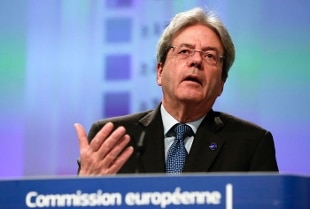Share
May 06, 2020 "Europe is experiencing an unprecedented shock from the Great Depression." Economic Commissioner Paolo Gentiloni said this when commenting on the spring economic forecasts published by the Commission."It is now quite clear that the EU has entered the deepest economic recession in its history," added Gentiloni, recalling that the EU economy is expected to contract by a record 7.5% this year (7.7% in the euro area), more than in 2009 (-4.3% in the EU27, -4.5% in the euro area) "." In 2021 we expect a rebound of 6.1% in the EU and 6.3% in the euro area - he added - not enough to fully compensate for this year's loss. In other words, a large majority of Member States are expected to exhibit a lower level of economic activity than before the outbreak of this crisis at the end of 2021. "
Divergence over recovery threatens Eurozone
The divergence between the Member States both in terms of falling GDP due to the coronavirus crisis and in the ability to recover for the financial resources available "represents a threat to the internal market and to the euro area". Economic Commissioner Paolo Gentiloni said so, commenting on the spring economic forecasts published by the Commission. In the euro area "both the depth of the recession and the strength of the recovery will be uneven, conditioned by the speed with which the lockdowns will be removed, by the importance of services such as tourism in each economy and by the financial resources of each country", he Gentiloni explained. "This divergence poses a threat to the internal market and the euro area, but it can be mitigated through determined European action. We must live up to this challenge," warned Gentiloni.
Well government measures, Italy decides whether to use Mes
The measures taken by the Italian government to deal with the economic crisis following the pandemic go in the direction of strengthening the recovery. The EU commissioner Paolo Gentiloni said this during the press conference to present the spring forecast. "We all know that Italy has been hit by this pandemic in a very hard way and is the first country to have decided tough lockdown measures," said Gentiloni. The Commissioner for Economics recalled that the Commission's forecasts predict a "fairly strong recovery" of the Italian economy "in the second half of the year and in 2021: I believe that the measures taken by the government will help to go in this direction".
As for the possible use of MES credit lines, Gentiloni reiterated that it is up to governments to decide whether or not to activate them: "in Italy there is a debate - he added - but it is not for the commission to express itself".
ECB is an independent institution
"The ECB is an independent institution. Its independence is in the abse of European monetary policy". The EU Commissioner for Economics, Paolo Gentiloni, wrote on Twitter, commenting on the German Court's ruling on Quantitative easing.

